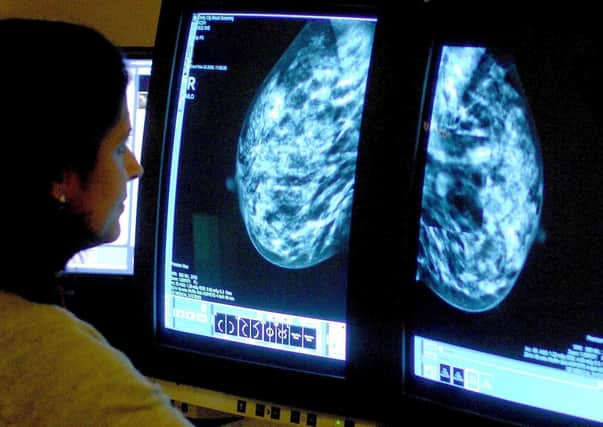NHS must innovate to deal with backlog in cancer treatment


The call comes as the latest statistics show a dramatic increase in the length of time patients have had to wait for diagnostic tests in Scotland during the coronavirus crisis.
A new report from Public Health Scotland has revealed two out of three people were forced to wait more than the target time of six weeks during the height of lockdown.
Advertisement
Hide AdAdvertisement
Hide AdThe findings have sparked concern over the potential knock-on impact on treatment for patients with life-threatening conditions such as cancer.
The data shows 98,332 Scots were still waiting for tests at the end of June – a rise of 7.6 per cent from pre-pandemic levels.
This included 68,407 who were waiting for radiology screening and 29,925 scheduled for endoscopy examinations.
The total number of patients on the waiting list was 11.4 per cent higher than the equivalent figure at the end of February – shortly before NHS Scotland put all non-urgent elective services on hold in mid-March. Some 63,550 people – around 65 per cent of all patients referred – waited for longer than six weeks.
Of the total, 41,463 (48.2 per cent) waited between 12 and 24 weeks, 25,721 (29.9 per cent) waited between 24 and 51 weeks, while 3,950 (4.6 per cent) had been waiting for a year or more.
The statistics show the number of patients being admitted began to increase on a weekly basis throughout the quarter, although admissions by the last week of June were still 70 per cent lower than in the last week of February.
Scottish health secretary Jeane Freeman acknowledged the difficulties health service had been contending with as a result of the pandemic, but insisted the most urgent cases would get priority.
She said: “The impact of the Covid-19 pandemic means there are significant operational challenges ahead for the NHS in Scotland, which are reflected in the statistics published today.
Advertisement
Hide AdAdvertisement
Hide Ad“In recent weeks, health boards have been carefully resuming a wide range of services, but the ongoing need for additional infection prevention and control measures means each clinic or theatre session will see fewer patients.
“However, those patients who require urgent, elective and vital cancer treatment have been, and will continue to be, prioritised.
“I recognise that there is a human story behind each and every one of these statistics, and that further delays can materially affect the quality of life of those waiting for care or treatment, with continuing pain and further anxiety.
“I want to be in a position where the NHS can speed up mobilisation. However, the safety of patients and staff is always at the forefront of decisions taken.”
Cancer charities have expressed concern over the backlog and warned that action must be taken to ensure patients don’t “pay the price”.
Kate Seymour, head of policy and campaigns in Scotland for Macmillan, said: “While not all of those waiting for tests will have suspected cancer, many of them will. Waiting to find out whether you have a life-threatening illness is one of the most stressful experiences anyone will endure.
“While we know the pandemic has been extremely challenging for the NHS, people with cancer can’t be expected to pay the price.”
She urged the Scottish Government to get the cancer care system back on track.
Advertisement
Hide AdAdvertisement
Hide AdMarion O’Neill, head of external affairs for Cancer Research UK in Scotland, said more healthcare workers, and equipment and innovations to increase capacity were necessary to tackle the backlog.
She said: “Hospital services have had to adapt and innovate to manage the impact of the pandemic and this will need to continue to prevent the number of suspected cancer cases mounting further.
“The public also need to feel confident that, if they have suspected cancer symptoms, they will receive a test swiftly and safely, with minimal risk of exposure to Covid-19.
“Protecting diagnosis and treatment areas from the virus must be a priority.”
Opposition politicians condemned the waiting lists.
Scottish Liberal Democrat health spokesman Alex Cole-Hamilton said: “The number of patients waiting for key tests is alarming. Behind each case on this list is a person and a family wracked with worry.
“The legacy of this pandemic means the NHS is going to be playing catch-up on screenings and important appointments for months or years.”
Monica Lennon, health and social care spokeswoman for Scottish Labour said: “With vital targets missed and thousands of patients queuing for treatment and tests, serious questions must be asked about the health secretary’s failure to steer our NHS through the pandemic.
“Jeane Freeman emptied our hospitals and cancelled thousands of appointments and it’s taken her five months to slowly get services up and running.
“Delays are putting patients at risk.”
Advertisement
Hide AdAdvertisement
Hide AdActions being taken to reduce waiting times include extended use of independent sector capacity to provide treatment to urgent and cancer patients in coronavirus-free sites, and resuming key services such as orthopaedics, ophthalmology and cardiology at the NHS Golden Jubilee hospital. Starting outpatient activity for orthopaedic and plastics patients at the NHS Louisa Jordan facility is among other measures.
Funding of £5.6 million has been provided for six mobile MRI scanners and three mobile CT scanners to support health boards across Scotland, while £7m has been invested to help restore endoscopy services.
A further £200m has been invested in a network of new elective and diagnostic treatment centres for patients requiring hip and knee replacements.
A Cancer Care Recovery plan is due to be launched this autumn.
Comments
Want to join the conversation? Please or to comment on this article.